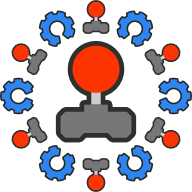From Thrive: link to original post

Another few months, another Thrive update full of game-changing new features and improvements! Headline features of Thrive 0.6.5 include organelle unlocking mechanics and fog of war for the patch map, adding more elements of progression to our evolving gameplay loop, together with further performance enhancements on top of those made by the rework last release.
Read on for more details, or visit the download page linked below to get the new version. As always, the update is available for free with our launcher, or you can support development by purchasing on Steam or Itch.io.
Thrive 0.6.5
Following the relatively feature-light release of Thrive 0.6.4, Thrive 0.6.5 brings you some major updates in mechanics that should make the whole game a more satisfying experience. See our patch notes for full details, or read on for some of the highlights.
Organelle Unlocks

The most notable feature of this update is the introduction of unlock mechanics for some organelles. In a regular game, several organelles are now locked from the start and the player must meet certain criteria to evolve them.
These criteria include:
- Being in a patch with a certain amount of a compound.
- Having another organelle in your cell for multiple generations.
- Engulfing a certain number of other cells.
- Having a certain amount of excess ATP production.
This list will likely grow in future as we extend the mechanic to other organelles and fine-tune current unlock conditions in light of player feedback.
Organelle unlocks should give a greater sense of progression and achievement to the game and lessen the impact of overpowered strategies. They also open the path forward to endosymbiosis, where advanced organelles can be unlocked by engulfing other cells with simpler organelles, a reflection of real theories about the origin of organelles such as mitochondria. We’re eager to hear your thoughts on this feature, so please let us know what you think on our community forums.
If you don’t want to play with organelle unlocks and preferred having all parts available from the start of the game, don’t worry! The feature in its entirety can be turned off in new game settings.

Patch Map Fog of War

While we hope organelle unlocks add a better progression system to building your creature, patch map fog of war should increase engagement with exploration. Patches not directly connected to your starting patch are now shrouded in mystery and must be revealed by traveling between patches.
Again, this feature is entirely optional, so head to new game settings to configure your desired exploration mode. You can even select a more intense variant for the truly adventurous where patches aren’t revealed until you enter them.
Further Performance Improvements

With the performance refactor from Thrive 0.6.4 as a base, we sought to push the game further and scrape out any performance advantage we could in this release. Overall performance is now significantly better than it was pre-0.6.4, which we hope will make playing a much more enjoyable experience.
In particular, this release adds multithreading for ECS systems to take advantage of hardware with multiple CPU cores, alongside some general tweaking to extract performance from some ECS systems. We’ve also analysed the game’s memory allocation to reduce overall memory allocations by about 75% during gameplay.
Aside from any potential gains from moving to Godot 4, it’s unlikely we’ll see any further performance work in the near future. We’ve come a long way from the game’s past performance issues though.
Expanded Thriveopedia and Tutorials

We’ve worked on improving information availability and clarity for the player in this release through a number of routes.
The Thriveopedia – our in-game information store – now supports inter-page linking. This has been especially useful as we’ve filled out the organelle pages with content taken directly from our wiki. To make the Thriveopedia more visible to players, we’ve added hotkeys while hovering over organelles in the editor. By default, press F1 to open expanded information about an organelle in the Thriveopedia.
We’ve also added a number of new tutorials and reworked some messaging within existing ones, particularly around organelle operations within the editor. Remember to ensure tutorials are enabled in the options menu if you want to use them!
Other Notable Changes
- Auto-Evo predictions in the editor now show energy first and population second. This should reduce confusion over population reductions due to larger individual cell size despite higher energy gained.
- Hovering over a species name in the patch map (in the editor or Thriveopedia) shows a preview of that species. We’ve found this very handy for understanding what prey and perils await you in nearby patches!
- New music track exclusive to volcanic vents.
- Reimplemented pilus damage cooldown to prevent cells dealing way too much damage.
- Added hotkeys for the macroscopic editor in later stage prototypes.
- Late multicellular speed now depends on the number of metaballs with myofibrils.
- Plenty of small fixes and additions.
Looking Ahead
We intend for the focus of our next release to be porting Thrive to Godot 4 to take advantages of benefits not available in Godot 3. While this will be a substantial amount of work, it’s likely new features and the gradual stream of small fixes will continue as well. After Thrive 0.6.6, focus will shift to completing features in line with our release roadmap.
As always, remember to join us for our developer Thrivestream later today, where we’ll cover the changes in this release and answer any questions you might have about the future of development.
You can also visit our feedback thread to give your thoughts on this update.
The post Devblog #40: Unlocking Potential appeared first on Revolutionary Games Studio.


You must be logged in to post a comment.